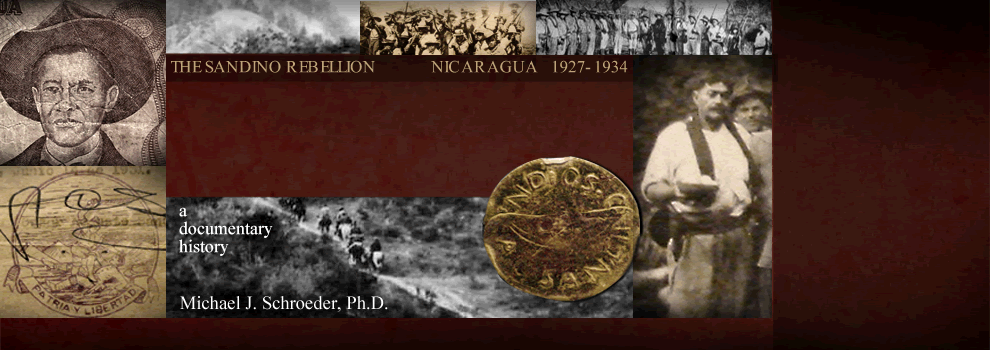|
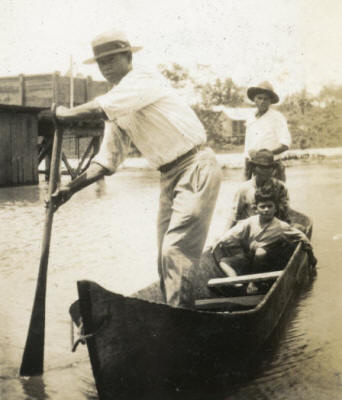 THIS IS THE fourth PAGE
of documents for the second HALF of 1928
on Nicaragua's Caribbean Coast region, housing
materials dated during the 34 days from September 14 to October 17.
THIS IS THE fourth PAGE
of documents for the second HALF of 1928
on Nicaragua's Caribbean Coast region, housing
materials dated during the 34 days from September 14 to October 17.
Mainly what we see here
are the continuing Marine-Guardia
efforts to get a fix on the EDSN in
the vast interior zones, and the
ongoing political struggles of
Creoles and Indians in the urban
centers of the Coast.
Especially noteworthy
documents on this page
include the anonymous 4-page
"intelligence notes" of 14 September
from the Merritt A. Edson papers,
which include some fascinating
information about Abraham Rivera and
other EDSN actors. Also worth
close attention are Capt. A.
DeCarre's notes from Bocay to Capt.
Edson in Poteca, especially his plea
of 25 September that Edson "Please
return boat of Indians immediately -
as they are under contract," and his
4 October message expressing concern
that he might "lose face with the
indians here" if a "SU MOO" (Sumu)
Indian named Jesús was not kept on
the payroll. Edson's 8-page
letter of 19 September continues in
the perceptive & descriptive vein of
all his letters home. Moving
to the Coast, and on a completely
different note, is the 18 July
letter from Livingston Cayasso,
Secretary of the Creole & Indian
League of Bluefields, to Gen. Frank
McCoy affirming Creole & Indian
voting rights in the upcoming
November elections (Bluefields
Weekly, 22 Sept.). The
documents in the "Claims of Dr.
Thomas and Captain Anderson" (24
Sept.) contain a boatload of
information on the "Negro
Revolutionists" of Bluefields (in
Capt. Kendall's words) and the role
of the British Consul Rees in the
byzantine world of Bluefields Creole
politics — and more broadly, of
Costeños ongoing struggles for their
full rights of citizenship before
the state and capital. The
other radiograms & reports &
missives & newspaper stories also
merit a careful read.
|
|
PERIOD MAPS
|
|
1894 mosquito
shore

27 MB,
library of congress
|
1920s
Standard Fruit

6.5 mb,
US National archives
|
1928 Rio wanks
Patrol

3 mb, us
national archives
|
1931 Moravian

2.4 mb,
coMENius press
|
|


|
14 September
1928 (1355).
Radiogram from Capt.
M. A. Edson, Poteca, to
Major Utley, Puerto Cabezas; copy CO
Bocay (2 images of 2 different imprints
of same document).
|
|
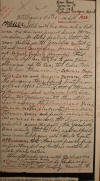
|
1.
14 September
1928.
Intelligence Notes (no author
indicated,
Edson
papers, "Confiscated Intelligence
Material"), p. 1.
"MORALES called
with his son and a boatman. His son was
present during the conversation. He
stated positively that the man killed in
the Yacalwas contact of 3d inst. was
Concepcion Hernandez and not Colonel
Ruperto Hernandez, that Ruperto left on
the 2nd or 3rd to join Pedro Altamirano
up the Cua; that Pedro took with him
three recruits – Saturnino Mesa, Felipe
Loza and Gregorio Barrera; that the
foregoing three had not heretofore
engaged in bandit activities in this
vicinity; that of the members of
Hernandez’ band who were with him before
the Yacalwas contact there still
remained missing the following: Luis
Nunez, Alejandro Mendez, Lino Sanchez,
Serapio Nedino, Saturnino Nedino, and
possibly Ladislao Mora (not certain as
to the last); that it was generally
understood among the people of the
Yacalwas-Baca vicinity that the above
eight and possibly nine men had gone
with Ruperto to join Altamirano; that
there were possibly four or five others
but as to those named he was fairly
certain. ¶ There formerly was in the
Yacalwas area a ‘Jues’ (Judge) surnamed
Briseño appointed by Sandino as his
representative in that vicinity.
Normally the . . . "
|
|
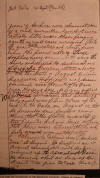
|
2.
14 September
1928.
Intelligence Notes (no author
indicated,
Edson
papers, "Confiscated Intelligence
Material"), p. 2.
" . . . ‘Jueces’
of Sandino were administrators of a
crude unwritten law, but were actually
little more than foraging agents, in
most cases wringing bits of grain,
beans, livestock and mostly from even
the poorest natives. These supplies were
accumulated along the river and shipped
to Sandino or one of this jefes. Briseño
is illiterate and a very cruel man. ¶ On
the tenth of August Briseño disappeared.
His pipante was seen abandoned near the
north of the Baca river the same day. He
is now supposed by Yacalwas people to be
with Sandino’s personal guard.
Morales personally saw Sandino’s body
guard move from Poteca up the Coco to
the Baca on August 10; that he
personally saw Sandino among them; that
the flotilla consisted of two pipantes
and one large bateaux; that there were
between thirty and forty armed men in
the party. ¶ Clemente Calderon was
Sandino’s ‘Juez’ at Guiguili. He
disappeared on 10 August, coincidentally
with Sandino’s movement up the Coco and
west through Baca. His band is about one
hour up the Guigiuli river from the
Coco. His wife . . . "
|
|
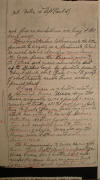
|
3.
14 September
1928.
Intelligence Notes (no author
indicated, Edson
papers, "Confiscated Intelligence
Material"), p. 3.
" . . . and five
or six children are living at that house
now. ¶ Maradiga (to whom Calderon wrote
the letters, forwarded to Brigade) is a
Sandinista Colonel. He with Colonel
Sanchez came down the Coco from the
Guiguili vicinity, to Poteca and were
immediately sent up to Gulkes Camp by
Sandino personally. This happened about
July 5-10. A group of about twenty armed
men accompanied them. ¶ Abram Rivera is
a distant relative of Guadalupe Rivera.
Mesa says that Rivera originally was a
peaceful river merchant trading all the
way from Santa Cruz to Puerto Cabezas.
For a long time he would have nothing to
do with Sandino’s activities. Sandino
finally impressed him and compelled him
to take over the service of supply. Mesa
also says that Rivera never has been
enthusiastic in Sandino’s cause. ¶ The
Riveras according to Mesa are one of the
two or three best families in Jinotega.
Abram Rivera has a brother, LUIS, who
works for some large company in Puerto
Cabezas. LUIS speaks English fluently,
went . . . "
|
|
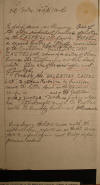
|
4.
14 September
1928.
Intelligence Notes (no author
indicated, Edson
papers, "Confiscated Intelligence
Material"), p. 4.
" . . . to
schoolhouse in Germany. One of the other
important families of Jinotega is the
CASTELLON family. RAFAEL a second
brother of Abram married one of the
Castellon girls. A brother of hers,
CAYETANO CASTELLON, married a sister of
Abram Rivera. The two families are thus
closely related. They are of the social
‘upper crust’ of Jinotega. ¶ Possibly
the ‘BALENTINA CASTELLON’, to whom
Marselina de Hernandez wrote the letter
found in the Yacalwas camp, is one of
the Castellon girls of Jinotega. Mesa is
finding out for us. This might connect
the Castellons with the Hernandez
brothers and Altamirano. ¶ Luis Deyez,
the little man with the withered arm,
reported six on the dot. He was told to
report again next Friday as per previous
orders."
|
|
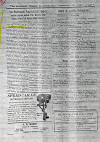
|
15
September 1928.
"Tell Nicaraguans
Americans Eat Babies - Sandino Spreads
This Word to Keep Voters from Polls,
Marine Major Reports,"
The
Bluefields Weekly.
|
|

|
15
September 1928.
Agreement between Major A. LeCarre,
Bocay, and Arthur Kittle, Sang Sang.
|
|

|
16 September
1928 (1150).
Radiogram from Major H. H. Utley, Puerto
Cabezas, to CO Marines Bluefields Major
A. B. Sage.
|
|

|
18 September
1928 (2015).
Radiogram from Major H. H. Utley, Puerto
Cabezas, to Gen. Feland, Managua, copy
to CO Bluefields, CO Bocay.
|
|

|
19 September
1928 (1022).
Radiogram from Gen. Feland, Managua, to
Major Utley, Puerto Cabezas.
|
|
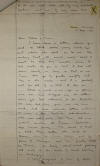
|
1.
19 September
1928.
Letter from Capt. M. A. Edson, Poteca,
to "Dear Mother o' Mine", p. 1.
"Dear Mother
o’Mine:- ¶ I have here a letter which
you sent to Ethel some many weeks ago
and which she sent on to me. By sending
that it would seem that it must be over
two months since I last wrote to you –
but it does not seem nearly as long as
that to me. Time does go by quite
swiftly out here in the woods – and it
is probably well for all of us that it
does so. ¶ About a week or so ago a
plane came over and dropped me the
letter which you had addressed to the
Rochester. Not only did they give me my
own mail, but also several letters
addressed to men of the Rochester
detachment – who are not with me here,
but over instead serving at Tuman,
several days travel away. The result of
that is that their letters then went to
Bocay, then to Puerto Cabezas and by
plane to Managua and then finally back
to Tuman – a long round-about journey
but such is the trails of mail delivery
in Nicaragua. ¶ I was surprised to hear
of Dad’s . . . "
|
|
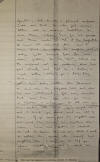
|
2.
19 September
1928.
Letter from Capt. M. A. Edson,
Poteca,
to "Dear Mother o' Mine", p. 2.
" . . .
operation, but it was a pleasant
surprise. I am sure that he will feel
enough better and be enough healthier to
more than repay him for his pains and
three weeks in bed at the hospital. He
must not overwork this, and I know that
he will be careful and realize full
benefits from the ‘new man’ feeling he
has now. Ethel says the enforced rest
has certainly done him good already and
that he is looking so much better than
for a long long time. ¶ I have today
written Dr. Stevenson to send me the
hospital bill and also his own
statement. You may remember that some
time ago when you were in Chester I
asked you to let me pay any doctors’
bill which you might incur and I think
you should send me all of them. If you
have paid the hospital bill and need the
money for anything else – moving – house
rent, clothing or whatnot – do not be
afraid to say so. But I want to settle
this doctors’ bill myself and anything
else I can do to help you, please.
Mother and Dad – don’t be . . . "
|
|
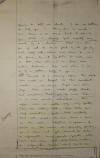
|
3.
19 September
1928.
Letter from Capt. M. A. Edson,
Poteca,
to "Dear Mother o' Mine", p. 3.
" . . . afraid to
tell me about. I do so little to help
you – Mary does so much – and there is
so much that I owe to you that I always
feel myself very much of a slacker. What
is a son for if not to be a part of the
family and help out when and where he
can so please do not hesitate to write
me or tell me when I am closer than
writing distance - how and when I can be
of a little help to you. ¶ Tonight it is
raining again. For about two weeks in
August we had excellent weather, no
rain, bright sun shiny days, blue skies,
white fluffy clouds, and everything that
goes to make life in a river country
delightful. The upper river is really
very very pretty. There are rolling
hills, high hills and steep mountain
passes that suddenly burst into sight as
one turns a bend in the river.
Everything is green – of course - too
much so, generally speaking, for I have
not yet learned to like or appreciate
heavy jungle growth with brush and vines
and underbrush making an impassible
barrier which has to be . . . "
|
|
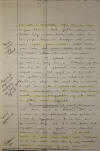
|
4.
19 September
1928.
Letter from Capt. M. A. Edson,
Poteca,
to "Dear Mother o' Mine", p. 4.
" . . . cut with
a machete before one can begin to pass
though. But further ahead, at Santa
Cruz, some sixty miles above here, the
jungle begins to disappear and one finds
open pine ridge – with tall pine trees
and grass under foot instead of brush.
Now the rains are starting once more. At
present it seldom rains for over a half
day – that is, if this day has been a
pleasant one – we can expect rains that
night or at the latest the following
morning - while if the night is clear
the next day is usually a wet one. As a
result the rivers are rising
considerably - the trails are becoming
muddy and transportation of all kinds is
getting more difficult. ¶ Tomorrow
morning I expect to send a boat down
river to Bocay. There is a lad in the
detachment who perhaps has a case of
appendicitis. He has been sick for
several days but it is only today that
symptoms seemed to point more definitely
towards a bad appendix. I do not want to
send him back now because to do so will
take all of my available boatmen and one
of my none too . . . "
|
|
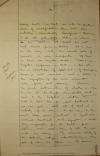
|
5.
19 September
1928.
Letter from Capt. M. A. Edson,
Poteca,
to "Dear Mother o' Mine", p. 5.
" . . . many
boats so that we will be quite short of
transportation here and our activities
considerably hampered. However I do not
feel like taking a chance on his holding
out until our next boat arrives from
Bocay. It is now on the way but the
exact date of arrival is very
indefinite. Up here we have no regular
doctor. There is a hospital corpsman –
that is a lad who has a knowledge of
first aid – of emergency dressings and
remedies – and a little of the symptoms
of the more common aches, pains, and
disease. However, the final
determination of whether a man is so ill
as to be immediately sent back to the
hospital – whether he will be held here
for such treatment as we can give and
all of that is entirely up to us. So,
you can see, I, too, must take some
interest in first aid, medical treatment
and symptoms – besides being responsible
for the health, food, clothing and well
being of all the men under my charge.
The common belief of the ordinary
citizen notwithstanding – the job of
being an officer in the service . . . "
|
|
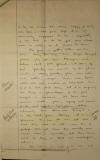
|
6.
19 September
1928.
Letter from Capt. M. A. Edson,
Poteca,
to "Dear Mother o' Mine", p. 6.
" . . . is by no
means the ever happy go lucky care free,
well paid life it is so commonly
supposed to be – especially if one tries
to do his job somewhere near as well as
it should be done. ¶ Our food is getting
better all the time. Every ten days, two
large transport planes fly over from
Managua and deliver about 2000 pounds –
a ton – of food. Yesterday we received
by the plane routes: baking powder,
flour, corn meal, lard, butter, sugar,
beans, rice, ham, rolled oats and
crackers or hard tack. Some of it is
lost each time, but it is surprising how
large a percentage of the food dropped
is recovered. We have also received
milk, jam, syrup and canned fruit and
meat by plane although ordinarily these
items are brought to us by boats from
Bocay. It is a pleasure to see the men
get all that they need to eat -–even
though it perhaps does not have the
variety one would like – especially
after they have lived so long on short
and unsatisfactory rations. ¶ Our houses
are not of the best – but . . . "
|
|
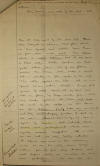
|
7.
19 September
1928.
Letter from Capt. M. A. Edson,
Poteca,
to "Dear Mother o' Mine", p. 7.
" . . . they do
keep most of the rain out. Planes also
brought us these – tent flies which we
have opened and which have three or four
men under each. The house which is
called Poteca had at one time a tiled
roof. While Sandino was still quite
active here, one of our planes bombed
the house and made a direct hit –
exactly in the center of the roof. This
rather spoiled the tiles - but we have
formed some native shingle – large, flat
pieces of wood – hewed out by hand and
held in place by large wooden pins –
which very nicely patched the holes and
keeps out most of the water. In this
house are the kitchen, pantry (storeroom
we call it), sick bay and sleeping
quarters of part of the men. Around one
camp we have a system of trenches and
outside that barbed wire entanglements
which are rapidly nearing completion.
All in all we are not too very badly
situated. The defenses are more or less
necessary since we are the only Marine
troops within four or five days distance
and must depend solely on natives for
our own protection. We have, too, a . .
. "
|
|
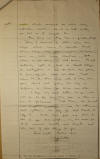
|
8.
19 September
1928.
Letter from Capt. M. A. Edson, Poteca,
to "Dear Mother o' Mine", p. 8.
" . . . radio
which connects us with the outside world
– so it is not really so bad as it might
be. ¶ How long we stay here –
problematical – Today I received a
letter from the major which seems to
indicate that other troops will soon
replace us here and we will move
elsewhere – but when or to where is not
known. It will certainly not be back to
Puerto Cabezas or civilization – but to
some new place to fix up for someone
else. That seems to be the chief role of
my men going ahead and paving the way or
preparing a house for someone else. ¶ I
hope my next letter to you will not be
so far from this one or this is from its
predecessor. Tell Mary she has not been
forgotten either – and she better start
fattening the calf for next March, I
hope!! With this goes my love to all of
you dear people, my best wishes for
Dad’s renewed health and strength, and
the best of all things to you. ¶ Good
night, Mother dear, ¶ Merritt"
|
|

|
21 September
1928 (1745).
Radiogram from Major A. B. Sage,
Bluefields, to Major H. H. Utley, Puerto
Cabezas.
|
|
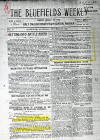
|
22 September
1928.
"Departmental Board of Elections: Letter
of Livingston Cayasso, Secretary Creole
& Indian League, Bluefields, July 18,
1928, re Rights of suffrage Mosquito
Indians and Creoles, addressed to Gen.
McCoy," The
Bluefields Weekly.
"DEPARTMENTAL
BOARD OF ELECTIONS OF THE DEPARTMENT OF
BLUEFIELDS, NICARAGUA ¶ September 5,
1928 ¶ From—The chairman, Departmental
board, Bluefields ¶ To—The American
electoral Mission, Managua ¶
Subject—Letter of Livingston Cayasso,
Secretary Creole and Indian League,
Bluefields, July 18, 1928 Re rights of
suffrage Mosquito Indians and Creoles,
addressed to General McCoy. ¶ 1. In
compliance with radio 31 August there is
returned here with the correspondence
above mentioned with the notes attached.
¶ 2. Upon my return from Managua, at the
session of the Departmental Board August
26, I informed the Board of the opinion
concerning the Mosquito Indians, that
is, they enjoyed the same rights as
secured to other Nicaraguan citizens by
the Constitution and as set forth in the
present Electoral Regulations. ¶ 3. The
members of the Board expressed
themselves as concurring in this
opinion. ¶ 4. At the session of the
Departmental Board on August 30 while
discussing the probable points of
objections to be raised against
registration and voters the Board, after
careful consideration of the laws
bearing on the case, expressed the
following opinion as to the status of
the Creole voters: ¶ (a). All Creoles
born in Nicaragua are native born
Nicaraguans and have the right of
suffrage as such. ¶ (b). Those Creoles
who were residents of the former
Mosquito Reserve before 1894 acquired
the rights of Nicaraguan citizens by the
provisions of the Harrison-Altamirano
Treaty, and have a right to vote. ¶ (c).
All other Creoles are foreigners unless
duly naturalized as provided in the
Constitution and in possession of their
papers. ¶ (d). A Creole may nevertheless
be registered in the British Consulate
as being of British parentage without
prejudice to his rights as a Nicaraguan
citizen, but in Nicaragua his obligation
and rights are paramount. ¶ The
Departmental Board by unanimous vote on
August 30 passed a resolution to include
this construction of the law in our
instructions to the Directorates. ¶
-----a Radiographic message of the 19th
of the present month from the National
Board of elections has authorized the
Departmental Board to put into effect
provisionally the above construction of
the law."
|
|
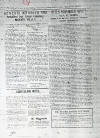
|
22 September
1928.
"After November, What?" By R. M.
Hooker, Student of the Moravian College
and Theological Seminary, Bethlehem, Pa.
The
Bluefields Weekly.
"In November of
this year Nicaraguans will go to the
polls to elect a president, whose
election, we are told, will be the first
in our turbulent history that will not
be marked by bloodshed and unscrupulous
political demagogy. The reason for this
fair election is the intervention of the
U.S in Nicaragua for the purpose of
bringing order out of chaos. Frankly, I
am not much in sympathy with any power
controlling our election. It is painful
to national pride, which every real
patriot should have for his country. At
the same time , however, I realize the
importance of our close relation with
our great Northern Neighbor; she has
pledged to assist us, to keep her word
is her duty to us, we have the moral
issue, let us wait and see. The
significance of this election in this
remote corner of the world are twofold.
In the first place it will mark a new
episode in American statesmanship in the
Caribbean area; it will prove to the
world the sincerity or insincerity of
the U.S in her dealings with this
important area. The present action of
the U.S . has quit definitely showed the
world and Latin Americans in particular
that she will not tolerate any
dissension at her back door. The United
States realize the value and the
predominant position that our country
will hold in the future. She warns us to
be progressive rather than reactionary,
and then will end intervention and
misunderstanding which tend to create
lasting hatred, which are not easily
eradicated. The second important phase
of this election will either establish
or disestablish the fact that
Nicaraguans are capable of
self-government, whether we know
anything concerning the value of the
ballot. Many of our critics contend
strenuously that we are incapable of
self government. They point to the whole
century of internecine and fratricidal
warfare which has torn our country
asunder, they point to our failure in
the development of education, in the
utilization of our untold natural
resources left untouched. It is a gloomy
picture and how true! We cannot deny it
and continue like an ostrich with her
head buried in the sand thinking no one
can seize her. As a Nicaraguan I can
find a as many arguments to prove that
we are capable of self-government if
given the right leaders and the same
opportunity. Law and order are not the
heritage of any select group; they are
rather the results of constructive
legislation, the education of the
masses, and a widespread knowledge of
democracy. Nicaraguans going to the
polls in November should think seriously
why are they voting, and allow their
candidate comply with the [wishes] of
their fellowmen. I have (?) on the
platforms of the parties concerned;
platforms are beautiful in themselves
but most of the time that is where their
beauty ends. My advice to my countrymen
then, is to analyze and dissect the
platforms and then vote. Government in
my opinion should be constructive, it
should not be destructive. It should be
left into the hands of the people. It
should never be into the hands of
avaricious leaders or oligarchs whose
only desire is to exploit the individual
for their own betterment. This has been
the united and eternal struggle of
mankind,- whether government is made for
the people or the people for the
government. History shows that the
people have always won and the cost has
been tremendous,-Magna Carta, the French
Revolution, and the Constitution of the
United States tell their tale. This has
been our greatest force of evil l, it
has caused prejudice and cruel
disintegration among or people that has
left our beloved land desolate and
mourning the deaths of our noble sons.
If leaders will realize that they are
commissioned by the people for
constructive efforts rather than for
mere selfish aggrandizement then we can
prove to our most outstanding critics
that we are able to govern ourselves.
After November Nicaraguans want to see
the construction of a railroad to the
Atlantic Coast, they desire a well
organized system of education the
particularly desire to see 51 per cent
of our National Bank owned by
Nicaraguans, they also want to see this
bank aid the development of agriculture
and endeavor to help our farmers.
Nicaraguans, especially those on the
East Coast, desire a program for the
general welfare of the Atlantic Coast.
Nicaraguans are also desirous of a more
cordial understanding with the U.S. in
order to avoid international
complications. The party that carries
out this program is the party
Nicaraguans will place in power."
|
|

|
23 September
1928 (1515).
Radiogram from Major A. B. Sage,
Bluefields, to Major H. H. Utley, Puerto
Cabezas.
|
|
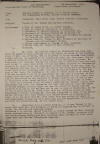
|
1.
24 September
1928.
Claims of Dr. Thomas and Captain
Anderson, report by Capt. D. J. Kendall,
Bluefields, 2nd Endorsement, p. 1.
"Enclosures: 1
Copy of claim of Dr. J. Oliver Thomas. ¶
2 Copy of claim of Captain W. H.
Anderson. ¶ 3 Statement of Captain
Kendall Re enclosure (1). ¶ 4 Statement
of captain Kendall Re enclosure (2). ¶ 5
Letter from Dr. Thomas to Mrs. Ana
Crowdell Re protest to British and
American Consuls. ¶ 6 Letter from Dr.
Thomas to Mrs. Crowdell Re services of
Thomas with Revolutionary Troops. ¶ 7
Letter from Edward L. Ingram to Mrs.
Crowdell. ¶ 8 Letter from Dr. Thomas to
Mrs. Crowdell. ¶ 1. Returned. ¶ 2. Mr.
Rees, the British Consul at Bluefields
has been here about 20 years in that
position it is believed. He lives at the
boarding house of Mrs. Ana Crowdell, who
is believed to be an octoroon from
Grande Cayman Islands. He appears to be
completely under her dominance. She is a
chronic revolutionist and an advocate of
the Pan-Negro movement. Mr. Rees under
her tutelage, during the entire time I
have been here has been most prompt to
seize upon every pretext and minor
incident to embarrass me whenever he
could favor the Nicaraguan Liberal party
in any way. Most of the negroes here who
were in the revolution and claim dual
citizenship of Great Britain and
Nicaragua have been particularly favored
by the support of Mr. Rees. The loading
of the arms at False Bluff on or about
May 17th was reported to me by an
Englishman who has been a resident of
Nicaragua since his early youth when he
was shipwrecked on this coast. During
the Revolution he was capture by Naaman
Connors who is now in jail at Bluefields
after being captured with arms near
False Bluff on March 23, 1928, as
recounted in my statement regarding Dr.
Thomas’ claim. This Englishman was given
100 lashes on his bare back and his wife
was raped by George Benham, another
negro who was the second of Connor and
was captured with him by the Marines and
is now in jail at Bluefields. As far as
can be ascertained Mr. Rees never took
any official action in this Englishmen’s
behalf although Mr. Rees has suggested
to some of the Senior Marine Officers
here that Connors and Benham should be
released from jail. It is believed that
Mr. Rees never took any action in behalf
of this Englishman because he is a white
man and his sympathies in politics are
with the Conservatives, if for either
side. ¶ 3. Enclosure 5 is a letter from
Dr. J. Oliver Thomas to the above
mentioned Mrs. Ana Crowdell in which he
requests her to protest to (both) the
British and American Consul. ¶ Enclosure
6 is another letters from Dr. J. Oliver
Thomas to Mrs. Crowdell which
substantiates my statement in regard to
Dr. Thomas’ services with the
Revolutionary Troops and also indicates
Mrs. Crowdell’s close relations with the
Creoles (Bluefields negroes) . . . "
|
|
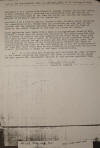
|
2.
24 September
1928.
Claims of Dr. Thomas and Captain
Anderson, report by
Capt. D. J. Kendall,
Bluefields, 2nd Endorsement, p. 2.
" . . . Enclosure
7 is a letter from Edward L. Ingram,
another Bluefields Creole, to Mrs.
Crowdell which indicates her connections
with the Creoles as Ingram is a Creole,
and at the time the letter was written
was Paymaster General of Moncada’s Army
at Rio Grande Bar. ¶ Enclosure 8 is a
letter from Dr. Thomas to Mrs. Crowdell
which indicates the connections of Dr.
Thomas with the revolution as also that
of Mrs. Crowdell and the intimacy
existing between them both and Mr. Rees
as shown by the remark ‘Regards to our
dear old friend Mr. Reese.’ ¶ These
enclosures were taken from the mass of
correspondence found at Mrs. Crowdell’s
house when her house was searched by the
undersigned for arms and a number of
pistols and some ammunition was found
there. There were also there at that
time a number of documents in her
possession which indicated more clearly
the way in which she had been using Mr.
Rees, the British Consul, in favor of
the revolutionists. However none other
of these documents were kept by the
undersigned as it was not anticipated at
the time that there would ever be any
necessity of disclosing the British
Consuls’ activities in behalf of the
Negro Revolutionists. ¶ 4. It is
believed the foregoing will elucidate
Mr. Rees interest in the claims
concerned and indicate the truth or
untruth of the claims and also explain
Mr. Patterson’s failure to take action
regarding them. ¶ Donald J. Kendall . .
. "
|
|
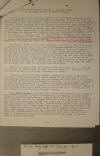
|
3.
24 September
1928.
Claims of Dr. Thomas and Captain
Anderson, Statement of
Capt. D. J.
Kendall in re Claim of Dr. J. Oliver
Thomas, Bluefields, p. 3.
" . . . Statement
of Dr. J. Oliver THOMAS. ¶ Dr. Thomas is
a Doctor of Pharmacy and is also
Catechist and Director of the Anglican
Church Mission at Pearl Lagoon, where
his house is used as temporary mission
quarters. He states as follows:- ¶ On
April 19th last Lieut. Carroll with
several Marines entered and searched his
house, alleging that he had rifles and
machine guns in its possession, and that
they had orders from Capt. Kendall to
search him and his house and to arrest
him if necessary. No arms were found. ¶
Whilst at Pearl Lagoon one of these
marines struck a police officer and the
incident, as also the search of Dr.
Thomas house was reported to the Editor
of the ‘Bluefields Weekly’. ¶ Dr. Thomas
subsequently visited Bluefields and went
to see Capt. Kendall complaining of the
way he had been treated. Capt. Kendall
insisted that he had arms hidden and
that that was why he was staying at
Pearl Lagoon; he added that he had been
so informed by certain men whom he had
captured with arms in their possession
and who were then in jail. The incident
of the Marine striking a police officer
was then referred to and Dr. Thomas
stated that both he and his son
witnessed the incident. The Marine was
summoned and admitted that he had ‘had a
fuss’ with the man, but denied striking
him. Capt. Kendall then ordered Dr.
Thomas to be put in jail for ‘telling
lies on a Marine’. Mrs. Thomas
afterwards visited Capt. Kendall and her
husband was released after 48 hours in
jail, Capt. Kendall telling him that he
was a mischief-maker and that he had
hidden arms. ¶ While in jail Dr. Thomas
was able to speak to three of the men
who were said to have informed Capt.
Kendall about him, and all three denied
having mentioned him to Capt. Kendall. ¶
Dr. Thomas now claims the sum of Five
hundred (500) U.S. Dollars as
compensation for ‘false charges brought
against men and illegal search of my
premises and holding us up to ridicule
and false imprisonment by United States
Marines in Nicaragua’. ¶ The above
statement is based on a letter written
by Dr. Thomas on May 12 last to Mr.
Rees, the British Consul at Bluefields
and forwarded by that officer to this
Legation. Mr. Rees subsequently reported
that ‘As Dr. Thomas refused to go back
to Pearl Lagoon unless he had some kind
of security that he would not be
molested in future, I accompanied Canon
Miler to see and have a talk with the
new Commander who came to relive Capt.
Kendall.’ ¶ British Legation, ¶ MANAGUA,
¶ July 3, 1928 . . . "
|
|
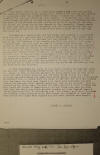
|
4.
24 September
1928.
Claims of Dr. Thomas and Captain
Anderson, Statement of
Capt. D. J.
Kendall in re Claim of Dr. J. Oliver
Thomas, Bluefields, p. 4.
" . . . Statement
of Captain W. H. ANDERSON. ¶ On March
8th Captain Anderson wrote to H.B.M.
Consul at Bluefields stating that on
February 23rd the U.S. Marines stationed
at the Bluff searched his boat, broke
open a cupboard and confiscated two
revolvers and a Winchester rifle, arms
which he had carried for many years on
the boat for the protection of himself,
his boat and its passengers and cargo.
Capt. Anderson was himself put in prison
and had to pay a sum of fifty dollars to
obtain his release. He claims the return
of the firearms and the $50. ¶ Copies of
the letter were forwarded by H. M.
Consul on March 9th last to this
Legation and to the Foreign office in
London. In his covering letter Mr. Rees
stated that Capt. Anderson is a British
subject but that his boat is on the
Nicaraguan register; he also stated that
he himself went with Capt. Anderson and
his Lawyer to see Capt. Kendall, of the
Marines. They were told that there was
no charge against Capt. Anderson and
that the Marines had acted as they did
because the captain had refused to leave
port on a certain day at the request of
the Major who was in a hurry to reach
Puerto Cabezas and that the Collector of
Customs became suspicious; the vessel
was consequently searched but nothing
was found except the arms. Capt.
Anderson’s lawyer told Capt. Kendall
that ‘the right to sail as a captain on
a vessel carries with it the right to
have arms on board for protection.’ ¶
Mr. Patteson, my predecessor who has in
charge of this Legation when Mr. Rees
letter was received, does not seem to
have taken any action in the matter, but
I have now received a despatch from the
Foreign Office calling for a report on
the case. In particular the Foreign
Office enquired whether there are any
regulations in force which forbid the
carriage of shipboard, or at any rate on
board Nicaraguan ships, or arms even
though only for protection purposes, and
also whether the Nicaraguan authorities
or the United States Marines were the
parties responsible for the seizure in
question. ¶ British Legation, ¶ MANAGUA,
¶ July 3, 1928. ¶ /s/ M. Stanford London
¶ Charge d’Affairs . . . "
|
|
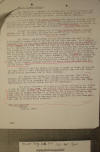
|
5.
24 September
1928.
Claims of Dr. Thomas and Captain
Anderson, Statement of
Dr. J. Oliver
Thomas, Bluefields, p. 5.
" . . . Statement
of CAPTAIN DONALD J. KENDALL, USMC, ¶ in
the CLAIM of Dr. J. Oliver Thomas. ¶ The
records of the British Consulate in
Bluefields state that John Oliver Thomas
was born at Pearl Lagoon, Nicaragua, in
1869 and that this profession is that of
‘medico’. Pearl Lagoon having been in
the Mosquito Reserve, Thomas together
with the other inhabitants of that
Reserve became Nicaraguan Citizens when
in 1893 the Mosquito Reserve as a result
of the Harrison-Altamirano Treaty came
under Nicaraguan control. On Sept. 5,
1914, Thomas registered in the British
Consulate in Bluefields. He is of the
class of negroes who although they are
Nicaraguan Citizens, at least while in
Nicaragua, and who always vote in
Nicaragua and take part in the
Nicaraguan Revolutions, nevertheless
when in trouble always rush to secure
and usually receive the best efforts of
Mr. Rees to free them from their
difficulties under the pretext that they
are British subjects. ¶ Dr. Thomas first
came to my notice when confined in the
active jail in Bluefields which was at
the time under Marine Control due to
lack of any organized native police
here. He was confined there for several
months on the charge of embezzlement and
at length was released due to the
efforts of friends in his behalf. These
same friends now state that he has never
made any effort to repay the money that
was advanced to free him from the
charges of embezzlement of the funds of
an old man whose estate he had charge.
While Thomas was in jail it came to my
notice that he had served not only as a
doctor with the revolutionary army but
also had actually born arms in the last
revolution here. ¶ After his release
from jail through the settlement out of
court of the charges of embezzlement he
went to Pearl Lagoon and although only a
pharmacist stared to practice medicine
as a doctor. ¶ After the battle of Pearl
Lagoon December 24, 1926, Thomas was
according to his statements to me in
charge of the clearing up of the
battlefield, burying the dead, and
collecting the arms left on the field.
In the fall of 1927 while Lieutenant
Carroll was at Pearl Lagoon
investigating the assassination of an
American by eight negroes there Thomas
stated to me that he could recover and
turn in to me at least 25 rifles and
probably could secure many more and turn
them in if I would get him the office of
Agent of Police at Pearl Lagoon. ¶ When
Naaman Connors together with three other
negroes were caught at False Bluff on
March 23 with a Machine Gun, 64 rifles,
and about 5,000 rounds of ammunition
preparing to embark them on a boat to go
to Sandino or to Honduras, two of the
negroes stated to me that Dr. Thomas had
some guns at Pearl Lagoon that he had
been preparing to ship at the same time
they were going to embark theirs.
Another native caught with ammunition in
his possession near False bluff about
April 7, 1928, also stated to me that
Thomas had guns in his possession at
Pearl Lagoon. Other civilians from Pearl
Lagoon reported to me at various times
that Thomas had a number of loaded
shells for a 37 millimeter gun in his
home at Pearl Lagoon. Lieutenant Carroll
was therefore sent over there to search
Thomas’ premises for them . . . "
|
|
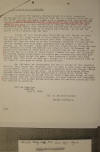
|
6.
24 September
1928.
Claims of Dr. Thomas and Captain
Anderson, Statement of
Captain W. H.
Anderson, Bluefields, p. 6.
" . . . Then
Thomas came to me in Bluefields
complaining about the search the Agent
of Police of Pearl Lagoon had a warrant
out for him for perjury in connection
with the incident where Thomas charged
the Marine with striking the Agent of
Police at Pearl Lagoon. I questioned the
Agent of Police about the affair as well
as the Marine accused of striking him
and the rest of the Marines who were
stationed at Pearl Lagoon at the time.
All denied any blows having been passed
in the argument. Thomas stated at that
time that he had not witnessed the
affair himself but that his 12 year old
son had seen the blows struck from a
distance and had told him about it. ¶
Inasmuch as a warrant was cut for Thomas
for perjury in connection with the
affair I retained him in jail at
Bluefields. Mrs. Thomas came to see me
at my office and claimed that her
husband had not been aiding her to pay
the expense of his family and that they
were in very poor circumstances, and
very much in need of financial aid from
him. So I agreed to let him out after 48
hours so that he could go to work and be
of some financial assistance to his
family but that I would exact from him a
promise of future good behavior and a
promise to refrain from sending any
further false articles to the local
newspapers concerning the Marines. In
the meantime I arranged to have Dr.
Thomas watched on his return to Pearl
Lagoon in hopes of finding out where he
had the arms and ammunition hidden. I
succeeded in getting the charges of
perjury against him quashed and after
his promising to keep the peace in the
future and not to send in for
publication any unfounded articles
against the Marines he was released. ¶ I
left Bluefields for leave in the United
States very suddenly about May 10, and
heard nothing further about the case
until I returned, June 30. Early in July
an English resident at False Bluff told
me that on or about May 17th a black
schooner lay off False Bluff during the
night opposite the point where the trail
from Pearl Lagoon comes out to the
beach. At daylight when he walked down
the beach to see what her boat was
loading from the beach the boat crew
jumped in their boat hurriedly and went
above the schooner which hauled anchor
and put to sea at once. When he arrived
at the place where the boat had been
loading he found a burlap bag with about
800 rounds of ammunition in it and there
were palm branches laid down the beach
over which wheeled objects had been
dragged leaving tracks like those of a
37 millimeter gun. The loading went on
at the same point where it was reported
to me that Thomas had intended to load
his arms on the same night when Connors
and the other Creoles were caught. ¶
DONALD J. KENDALL . . . "
|
|
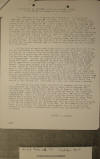
|
7.
24 September
1928.
Claims of Dr. Thomas and Captain
Anderson, Statement of
Capt. D. J.
Kendall in Re Claim of Capt. W. H.
Anderson, p. 7.
" . . . Statement
of CAPTAIN DONALD J. KENDALL, USMC, ¶ in
the CLAIM of Captain N. H. Anderson. ¶
The Schooner L. M. Anderson was searched
by Marines and a Nicaraguan Customs
Officer at El Bluff, Nicaragua, on
February 23, 1928 and all the arms
aboard were confiscated. A short time
before this Major Utley of the Marine
Corps and several enlisted men were
about to sail for Puerto Cabezas aboard
her but they were told late in the
afternoon of the sailing date that she
would not sail until the next day. So
they returned to Bluefields. In the
night she attempt to sail suddenly,
without them, but was prevented from
doing so. The next day she was about to
sail but when the Marines arrived at the
Bluff to go aboard her Capt. W. H.
Anderson again postponed the sailing and
the Marines went on another boat and she
sailed shortly afterwards. It appeared
therefore that the Captain desired to
sail without any Marines aboard, and in
view of that fact she was regarded with
suspicion. ¶ At the time attempts were
being made to run arms from the vicinity
of Bluefields to Cabo de Gracias for
further transportation to Sandino or to
Honduras for the revolution brewing
there. Accordingly the policy of
searching all boats leaving from the
Bluff for arms by the Marines and for
other contraband by Nicaraguan Customs
authorities was inaugurated. During the
search of the Anderson for arms on
February 23, Capt. Anderson refused to
open the cupboard on his vessel and it
was broken open and two pistols and a
Winchester rifle were found. These were
seized and he was turned over to the
Chief of the Native Police at Bluefields
with the charges against him of having
arms in his possession. They fined him
and released him. He then came to my
office and I told him that if he had
settled his case with the native
authorities that there were no further
charges against him. When he complained
about lack of protection for his vessel
without arms I told him that his own
suspicious actions and very evident
desire not to sail with any Marines
aboard his schooner had brought about
the search of his vessel and otherwise
he would not have been bothered. ¶ The
search was made under authority of
Decrees #45 and 46 of the President of
Nicaragua dated June 3, 1927, which
Decrees the Marines had orders under
Force Orders #20 of June 5, 1927 to
assist in enforcing. The search was made
by combined Marines and Nicaraguan
Forces under orders of both the Marines
and the Nicaraguan Customs Authorities.
When as a result of his case the Marine
Force at Bluefields was informed that
ship masters would be allowed to carry
arms aboard their vessels for protection
of passengers and crew Capt. Anderson
was informed by the undersigned that his
arms could be returned to him on
application at the Barracks. As the
undersigned was on leave in the States
for several months after this it is not
known whether or not Capt. Anderson ever
applied for or received the arms in
return. ¶ DONALD J. KENDALL"
|
|
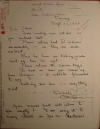
|
25 September
1928.
Letter from from Capt. A. DeCarre,
Bocay, to
Capt. M. A. Edson, Poteca.
|
|

|
26 September
1928 (1522).
Radiogram from Capt.
M. A. Edson, Poteca, to
Major H. H. Utley, Puerto Cabezas.
|
|

|
27 September
1928 (2153).
Radiogram from Major
H. H. Utley, Puerto
Cabezas, to Gen. Feland, Managua, with
copies to COs of Bocay, Poteca, Garrobo.
|
|

|
28 September
1928 (2351).
Radiogram from Capt.
M. A. Edson, CO Poteca,
to CO Bocay, copied to Major Utley,
Puerto Cabezas, and CO Garrobo.
|
|
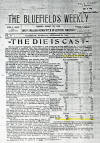
|
29 September
1928.
"The Die Is Cast,"
The Bluefields Weekly.
"The die is
cast and Nicaraguan conservatism is
now face to face with a condition that
must have already begun to cause the
leaders of the party serious misgivings
as to a way out of the dilemma in which
they are placed before the eyes of the
world, but more especially before the
people of the Americas, that had for so
many years been led to foster a false
idea as to the right of conservatives to
rule in Nicaragua. ¶ The people of a
democracy most naturally expect that the
minority must of necessity give way to
the majority and consequently when the
Conservative party of Nicaragua was able
to hold the reigns of Government for
nearly two decades, during which time
several presidential elections have been
held with the Conservative Party always
coming out victorious, and having their
resulting regimes recognized and
respected by the other nations of the
world, it naturally followed in the
minds of the people of other parts, that
the right to rule was with that party. ¶
Liberal protests and denouncement of
frauds at elections invariably received
the “cold shoulder” from those before
whom their protests went. And
conservatism was able thus to continue
treating with the most sickening
contempt the great majority of the
people of the state. It would have been
an easy matter for Liberalism to have
rightened the evil by having recourse to
arms long before 1926, but holding due
regard for the treaties and compacts in
which it was clear that revolutions
would not be allowed to prosper by those
having to do with the other side of
these treaties and compacts, there was
nothing to do but abide the time when,
through force of circumstances
conservatism Would so discredit itself
as to fall out of grace through the
workings of its own sins. ¶ But the die
is cast and conservatism has but one
course now to pursue. The cards have
been laid out and the first day’s play
has had the result of showing to all who
wishes to see that the Conservative’s
majority bluff has passed away forever.
¶ There is a phrase that Nicaraguans
like very much to use: “En el camino se
arreglarán las cargas”. (Things will
adjust themselves on the way). And
indeed, it is this phrase that the
Conservatives had in mind when they
accepted, rather, asked for President
Coolidge’s good offices through his
representative, Colonel Stimson, at
Tipitapa to bring about peace on
condition of free elections in 1928.
Accustomed as they have always been to
deceive in the most artful manner, and
harboring a ridiculous belief that the
Government of the United States was
irretrievably lost in love with their
winsome party, it would soon after
swallow some tendered bait, whereby the
Tipitapa agreement would find a place in
the scrap heap. Conservatism never for
moment really took the agreement
seriously; they firmly believed it a
trap of Colonel Stimson to allure
Moncada into turning over his arms.
Devoid of all political ethics
Nicaraguan conservatism could not credit
any other government with that value in
its assets. ¶ The only course we
see under the circumstances for the
Conservative Party to pursue is to
accept with as much grace as they
possibly can, the tremendous expose to
which they have been subjected and, with
a resolution to make atonement for their
past sins get into a school of ethics
and strive to understand that: “the
mills of the gods grind slowly but they
grind exceeding fine”. ¶ The result of
the first day’s inscription in the
Interior showed 3 to 1 in favor of the
Liberals and here is how it stands on
the Atlantic Coast at this writing:
……totals: Liberals 3305, Conservative
687, total: 3992…..¶ According to the
above report of the citizens inscribed
on the first and second days of
inscription in the Cantons heard from
the Liberal party registered 82.79%; the
Conservative arty 17.21 per cent. Al
indications point to the fact that the
Conservative Party will not register
very many more on the Atlantic Litoral.
¶ NOTE: As we were going to press we
received the following advice of
inscriptions on the 23: Wounta 113
Liberals, 3 Conservatives; Tungla 110
Liberals, no Conservatives."
|
|
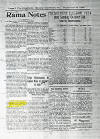
|
29 September
1928.
"Rama Notes,"
The Bluefields Weekly.
|
|

|
29 September
1928 (1022).
Radiogram from Major
H. H. Utley, Puerto
Cabezas, to Gen. Feland, Managua.
|
|

|
29 September
1928 (1702).
Radiogram from Gen. Feland, Managua, to
Major Utley, Puerto Cabezas.
|
|
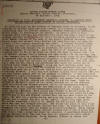
|
29 September
1928.
Statement of 1st Lt. G. W. Shearer,
USMC, in case of James Hibbert of Bilway
(Bilwi), p. 1.
"At about six
p.m. on the evening of February tenth or
eleventh, it was reported to me that
there was some trouble in a canteen in
Bilway. I immediately sent the Provost
Sergeant, Sergeant Frederick G. Lewis,
U.S. Marine Corps, to investigate and
report. In about a half an hour,
Sergeant Lewis returned and reported
that there had been a fight in the
canteen operated by Hibbert, and that a
civilian employee of the Brabman Bluff
Lumber Company by the name of Lee
Arnold, Private Shockley, U.S. Marine
Corps and several other Marines had been
involved, but upon his arrival at the
canteen everything was quiet. I ordered
Sergeant Lewis to return and make an
examination of the premises and to note
whether there had been any damages and
to ascertain the amount of such and to
obtain witnesses if possible. Upon the
return of Sergeant Lewis, he reported
that so far as he could see there had
been no damage done, but that Hibbert
claimed that a lantern had been kicked
off the ceiling, and other damages that
he claimed would amount to about forty
dollars ($40.00). He reported that he
had questioned neighbors of Hibbert’s as
to any commotion or row and that he
could not get any information. The next
morning I sent for Mr. Arnold and
questioned him about the matter and he
admitting being drunk in Hibbert’s place
and that anything might have happened.
He also stated that he accepted full
responsibility and that the Marines were
not at fault and that he would pay any
reasonable amount to satisfy Hibbert. I
told him that Hibbert claimed forty
dollars ($40.00) and this amount Arnold
gave me for payment to Hibbert. I then
proceeded to Hibbert’s place accompanied
by the Commandante to make an
investigation and I instructed the
Commandante to appraise any damage that
might have been done and that Mr. Arnold
was willing to pay for same. Upon the
arrival at Hibbert’s shack of two rooms,
nothing out of the ordinary could be
noticed and Hibbert pointed out to the
Commandante several things that he had
claimed that had been broken in the
fight. I cannot remember the items, but
the Commandante appraised all damages at
twenty eight dollars ($28.00). This
amount was offered to Hibbert which he
refused to accept. In going through the
backroom it was noted that Mrs. Hibbert
was in bed and Hibbert claimed that she
had been struck in the fight. We sent
for a native doctor and gave him orders
to attend Mrs. Hibbert and to submit the
bill to Mr. Arnold. About four days
later, the doctor submitted a bill to
Mr. Arnold for ten dollars ($10.00),
which was paid and receipt obtained. The
doctor was asked if this would be the
final charge and if Mrs. Hibbert was
well. He replied in the affirmative and
stated that she need no further
treatment. While making examination of
Hibbert’s place, Hibbert claimed that a
sum of money had been stolen from a
cigar box under the counter. I
questioned Mr. Arnold and the Marines
about this and they were all emphatic in
their denial of taking anything
whatever. In my opinion, Hibbert is
taking this . . . "
|
|
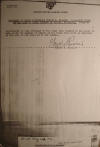
|
29 September
1928.
Statement of 1st Lt. G. W. Shearer,
USMC, in case of James Hibbert of Bilway
(Bilwi), p. 2.
" . . .
opportunity to take advantage of the
fight that occurred in his place to make
claim for damages in excess of the value
that could be realized by the sale of
his place as it now stands. ¶ GEORGE W.
SHEARER . . . "
|
|

|
30 September
1928 (1112).
Radiogram from Capt.
M. A. Edson, CO Coco
Patrol, Poteca, to Major Utley, Puerto
Cabezas.
|
|

|
1 October
1928 (1123).
Radiogram from Gen. Feland,
Managua, to
Major H. H. Utley, Puerto Cabezas, copy to CO
Bocay.
|
|

|
2 October
1928 (0933).
Radiogram from Capt.
M. A. Edson, CO Poteca,
to Major H. H. Utley, Puerto Cabezas, copy to
CO Bocay.
|
|

|
3 October
1928 (1600).
Radiogram from Gen. Feland,
Managua, to
Major Utley, Puerto Cabezas.
|
|

|
3 October
1928 (2330).
Radiogram from Jefe Director GN,
Managua, to Major Sage, CO Bluefields,
copy to Major Utley, Puerto Cabezas.
|
|
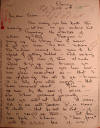
|
4 October
1928.
Letter from Capt. A. DeCarre, Bocay, to
Capt. M. A. Edson, Poteca, p. 1.
"My dear Edson:-
¶ Am sending you two boats this morning
– rations as per enclosed list. ¶
Regarding the retention of Indians up
there. Thompson is going up the Bocay
River tomorrow to get you some ‘SU MOO’
medicine. The Indians around here seem
to be afraid of getting killed – while
working for you some of them already
refuse to go up river because you have
kept these men you have now – now please
understand me – that I am explaining
this all to you – because it is only
your ration supply – that I am concerned
about. There is a man by the name of
JESUS – who I have promised personally –
that you will not hold. It seems that he
was with Sandino, is scared to death –
that he will be shot – if he is caught
up there. Let him come back – because I
‘lose face’ with the Indians here if [?]
. . . "
|
|
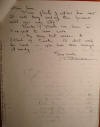
|
4 October
1928.
Letter from Capt. A. DeCarre, Bocay, to
Capt. M. A. Edson, Poteca, p. 2.
" . . . detain
him. ¶ I have plenty of rations here now
I will keep sending them forward until
you say stop. ¶ Burns and [?] are here
so I expect to leave soon. ¶ My very
best wishes to Pollock and Cook and
don’t work too hard – you have done
enough already. ¶ Sincerely, ¶ A.
DeCarre"
|
|
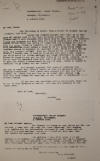
|
4 October
1928.
Letters from Major Hans Schmidt,
Managua, to "My dear Edson," Poteca, and
"My dear Colonel Dunlap," Managua.
"My dear Edson:-
¶ The following is quoted from a letter
from Colonel Dunlap received this date:
¶ ‘Navas and Jackson believe that there
is an outpost of Sandino east of the
Mine Americana between there and La Pas
(Kenyon MAP) (I have directed that these
maps be sent you). If reinforced Jalapa
can approach the area from the trails
running east from Jalapa Region to the
Coco. San Albino if reinforced can
approach the area from the mouth. Edson
is committed to an approach up the
Congejas. This combination would insure
a clean up of the area—would block
Sandino’s escape to Honduras and
movement south. If it does nothing else,
may develop Sandino’s based and result
in the destruction of stores. I should
like to back up Edson and also make a
more complete job while about it.
Edson’s movement may block retirement of
enemy forces or again he may get the
full force of the enemy contact. In the
latter case the movement from this side
will not be able (probably) to give him
actual reinforcement in case of need. I
think he should be cautious to go slowly
and not too afar.’ ¶ This General
approved this plan and aviation will put
you in touch with Colonel Dunlap so that
the movements may be properly
coordinated. When planes make contact
with you they will be directed to drop
this and then to go Ocotal with another
drop. They will then return for anything
you may desire to communicate to Colonel
Dunlap. ¶ If you have any questions
either ask Colonel Dunlap or us and we
will endeavor to answer. Will keep you
informed of all Bandit news. ¶ Best of
luck, ¶ Sincerely, ¶ Schmidt, ¶ B-2. ¶
My dear Colonel Dunlap: ¶ The General
has shown me your letter and his answer
thereto. I have this date sent you Edson
itinerary. This evening I am sending him
the information contained in your letter
with as much of the plan outlined
therein as I could and also word that
the General has approved your plan. ¶ In
addition I have told Edson that air
service is to provide the liaison
necessary and for him to acquaint you
with his plan. I believe it would be
highly desirable to give him some
additional details of your plans when
you have worked them out. ¶ If there is
anything else you think of that I should
do please let me know. ¶ Kindest
regards, ¶ Very sincerely, ¶ Schmidt"
|
|

|
7 October
1928 (0400).
Radiogram from Capt.
M. A. Edson, Coco Patrol
at Congojas Mouth, to Major H. H. Utley,
Puerto Cabezas.
|
|

|
7 October
1928 (1430).
Radiogram from Capt.
A. DeCarre, CO Bocay,
to Major Utley, Puerto Cabezas.
|
|

|
9 October
1928 (2045).
Radiogram from Gen. Feland, Managua, to
Major Utley, Puerto Cabezas.
|
|
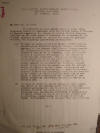
|
15 October
1928.
Letter re James Hibbert of Bilway, from
Gen. Feland,
Managua, to British Consul,
Managua, p. 1.
“In reference to
your letter dated 10 July, 1928,
enclosing copies of memoranda from the
British Charge d’Affaires at Managua
regarding the claims of several British
subjects resident on the east coast of
Nicaragua for compensation for alleged
injuries suffered by them at the hands
of American Marines, the following
information is submitted: ¶ (a) Re claim
of James Hibbert of Bilway, Puerto
Cabezas, investigation discloses that
Lee Arnold, a civilian employee of the
Bragman Bluff Lumber Company assumed
full responsibility for the disturbance
created in Hibbert’s cantina on 16
February, 1928, and offered to make a
financial settlement for any reasonable
claim that was submitted. The native
commandante investigated the matter and
appraised all damages reported by
Hibbert at $28.00. Hibbert refused to
accept payment in the amount of $28.00
but allowed Arnold to pay $10.00 as
payment in full for medical treatment
received by Mrs. Arnold for injuries she
is alleged to have received in the above
disturbance. Although Hibbert had
originally asked for compensation in the
amount of $40.00 it is believed that he
now hopes to secure a settlement far in
excess of the actual damages by
endeavoring to make the matter an
official one. ¶ (b) Re claim of Doctor
J. Oliver Thomas of Pearl Lagoon, the
record of the claimant shows that he not
only actively participated with the
Nicaraguan revolutionary movement in
1926, but since that time has been
connected with individuals attempting to
smuggle arms to bandit forces and has by
his radical actions been a disturbing
element among the Creoles on the east
coast. Furthermore, it is believed that
the activities . . . ”
|
|
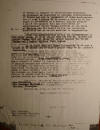
|
15 October
1928.
Letter re James Hibbert of Bilway, from
Gen. Feland, Managua, to US Minister,
Managua, p. 2.
" . . . of Thomas
in support of revolutionary movements in
Nicaragua as disclosed by personal
correspondence of Thomas and now in
possession of these headquarters are of
such a nature as to create a doubt as to
his right to protection as a neutral
English subject. I am of the opinion
that any confinement or embarrassment
Doctor Thomas suffered at the hands of
Marines was the result of his own
pernicious activities and he is not
entitled to compensation. ¶ After due
consideration of all the circumstances
in the above cases, it is my belief that
neither Mr. Hibbert nor Doctor Thomas
have any cause for action against the
United States and I cannot approve their
claims. ¶ It is hoped that the above
information is of such a nature as to
enable you to base a proper reply to Mr.
London’s memoranda."
|
|
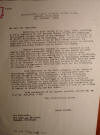
|
15 October
1928.
Letter re schooner LM Anderson, from
Gen. Feland,
Managua, to US Minister,
Managua.
"Referring to
your letter of 10 July, 1928, enclosing
a claim submitted by the British Charge
d’Affaires regarding the alleged illegal
search of the schooner “L. M. ANDERSON”
at El Bluff, Nicaragua, on 23 February,
1928, I have the honor to inform you
that the activities of this vessel
aroused the suspicion of the Nicaraguan
Customs authorities and the Marines
assisted the local authorities to search
the vessel. ¶ Captain Anderson refused
to open a cupboard on his vessel with
the consequent result that it was opened
by force and the two pistols and one
rifle contained therein were confiscated
and held by the native Chief of Police
at Bluefields, Nicaragua. Captain
Anderson was fined by Nicaraguan
authorities for a violation of
Nicaraguan law but was informed that the
arms would be returned to him upon his
application to the Chief of Police and
his assurance that the arms were for the
protection of passengers and crew. ¶
With reference to the last paragraph of
Mr. London’s memorandum regarding this
incident, it is suggested that the
British Charge d’Affaires communicate
with the Nicaraguan Government for
complete information and copies of
current regulations governing the
carriage on shipboard of arms and
ammunition. Rulings in such matters are
made by the Nicaraguan authorities but
when opposition and evasion are
encountered by local native authorities
it is considered the duty of our forces
to assist in preserving law and order.”
|
|
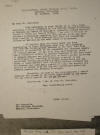
|
16 October
1928.
Letter re claim of William N. Ricketts,
George Marchall, Rober W. Brown & Ernest
Thomas, from Gen. Feland, Managua, to US
Minister, Managua.
"With reference
to your letter of 10 July, 1928,
enclosing a claim forwarded by the
British Charge d’Affaires at Managua on
behalf of William N. Ricketts, George
Marchall, Robert W. Brown and Ernest
Thomas, I am glad to be able to transmit
information regarding this matter which
has just been received by these
headquarters from the commanding officer
of Marines on the east coast of
Nicaragua. ¶ It appears that the above
named men were endeavoring to leave
Nicaragua when they were detained and
held for investigation because of the
fact that they were not in possession of
the necessary and required papers of
identification. At the time they were
detained there was a determied effort by
lawless elements on the east coast to
smuggle weapons and ammunition to bandit
groups operating in Nicaragua and
suspicion naturally attached to any
individual travelling without proper
credentials and any delay or
embarrassment that the above persons
suffered was the natural and inevitable
result of their own neglect and failure
to comply with the law and regulations
governing persons leaving and entering
Nicaragua. ¶ Therefore, in view of the
circumstances I cannot consider the
claims of the above individuals as the
basis for any actions against the United
States.”
|
|

|
17 October
1928.
Air Mission for Thursday, Oct 18,
Lt. W.
C. Hall, Puerto Cabezas.
"1. One plane
flight to Bluefields. Plane at disposal
of Captain Rose (probably make
reconnaissance of SAN JUAN river). ¶ 2.
Memo. for Lieut. Conway: Captain Rose
also has been granted permission to
divert the returning planes for a
military mission southern sector if he
so desires. ¶ 3. Memo. to Area
Quartermaster: freight for Bluefields
may be sent."
|
|
|
|
|
PREVIOUS
NEXT
|
|
|
|
|
|
|
|
